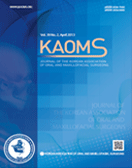Journal of the Korean Association of Oral and Maxillofacial Surgeons
- P-ISSN2234-7550
- E-ISSN2234-5930
- SCOPUS, KCI, ESCI
 ISSN : 2234-7550
ISSN : 2234-7550
Epistaxis in dental and maxillofacial practice: a comprehensive review
Grigorios Georgios Dimas (AHEPA Hospital)
Despoina Papaioannou (AHEPA Hospital)
Christos Savopoulos (AHEPA Hospital)
Jiannis Constantinidis (AHEPA Hospital)
Abstract
The lifetime incidence of epistaxis in dental and maxillofacial practice has been reported to be as high as 60% and can be caused by dental implant placement, Le Fort I osteotomy, intranasal supernumerary tooth, odontogenic tumors, blood disorders and maxillofacial trauma. Most epistaxis cases are minor and easily managed with direct compression on the nares for 10 minutes. For more significant or recurrent epistaxis, other techniques might include electrocautery, anterior or posterior nasal packing, or Foley catheter balloon. For patients with refractory epistaxis, cauterization of the sphe-nopalatine artery under endonasal endoscopy or embolization of the internal maxillary artery should be performed. Epistaxis control is required in pa-tients diagnosed with inherited or acquired bleeding disorders or with drug-induced coagulopathies during dental procedures. In these cases, hemostatic system adjustment and hemostasis achieved by local and adjunctive methods are required. Dentists and maxillofacial surgeons must be aware that the nasal cavity is a potential source of perioperative hemorrhage. Depending on the invasiveness of the dental intervention, preoperative involvement of the hematologist and cardiologist is usually necessary to reverse anticoagulation or to cease anticoagulant therapy.
- keywords
- Orthognathic surgery, Dental implants, Epistaxis, Maxilla, Blood coagulation
- 다운로드 수
- 조회수
- 0KCI 피인용수
- 0WOS 피인용수